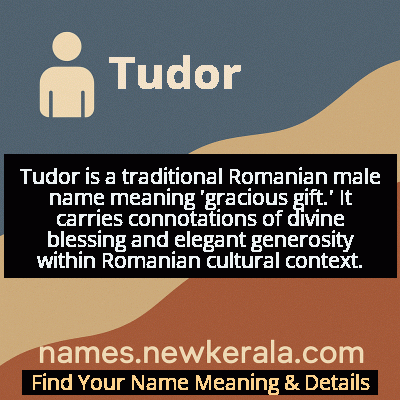Tudor Name Meaning & Details
Origin, Popularity, Numerology Analysis & Name Meaning of Tudor
Discover the origin, meaning, and cultural significance of the name TUDOR. Delve into its historical roots and explore the lasting impact it has had on communities and traditions.
Name
Tudor
Gender
Male
Origin
Romanian
Lucky Number
6
Meaning of the Name - Tudor
Tudor is a traditional Romanian male name meaning 'gracious gift.' It carries connotations of divine blessing and elegant generosity within Romanian cultural context.
Tudor - Complete Numerology Analysis
Your Numerology Number
Based on Pythagorean Numerology System
Ruling Planet
Venus
Positive Nature
Harmonious, responsible, caring, and artistic.
Negative Traits
Overly idealistic, superficial, possessive, or jealous.
Lucky Colours
Pink, turquoise.
Lucky Days
Friday.
Lucky Stones
Diamond, turquoise.
Harmony Numbers
2, 3, 9.
Best Suited Professions
Artists, musicians, teachers, healthcare workers.
What People Like About You
Warmth, nurturing nature, artistic flair.
Famous People Named Tudor
Tudor Vladimirescu
Revolutionary leader
Led the 1821 Wallachian uprising against Ottoman rule
Tudor Arghezi
Poet and writer
One of Romania's most celebrated poets and Nobel Prize nominee
Tudor Gheorghe
Actor and folk singer
Renowned Romanian actor and folk music interpreter
Tudor Chirilă
Singer and actor
Lead vocalist of Romanian rock band Vama Veche
Name Variations & International Equivalents
Click on blue names to explore their detailed meanings. Gray names with will be available soon.
Cultural & Historical Significance
Throughout Romanian literature and arts, the name Tudor has been borne by numerous influential cultural figures, including the celebrated poet Tudor Arghezi, whose works defined modern Romanian poetry. This cultural legacy makes the name synonymous with artistic excellence and intellectual depth in Romanian society. The name's enduring popularity reflects its dual nature—combining traditional religious connotations with a strong sense of national identity and cultural heritage.
Extended Personality Analysis
Individuals named Tudor are often perceived as charismatic and gracious, living up to the name's meaning of 'gracious gift.' They typically possess natural leadership qualities combined with a diplomatic approach to relationships, making them effective communicators and mediators. Their gracious nature often manifests as generosity and a genuine interest in others' wellbeing, creating strong social bonds and lasting friendships.
Tudors are frequently characterized by their strong sense of purpose and determination, reflecting the historical significance of the name in Romanian culture. They tend to be principled individuals who value tradition while also embracing innovation when necessary. This balance between respect for heritage and forward-thinking makes them adaptable yet grounded. Their intellectual curiosity and artistic sensibilities often lead them toward creative or leadership roles where they can express their vision while maintaining their characteristic grace and dignity.
Modern Usage & Popularity
In contemporary Romania, Tudor remains a popular and respected male name, consistently ranking among the top 50 names for boys. Its usage reflects both traditional values and modern appeal, with parents choosing it for its strong cultural resonance and elegant sound. While maintaining its traditional popularity in Romania, the name has also gained some international recognition through Romanian diaspora communities. Recent trends show a slight decline in urban areas but continued strong usage in regions with stronger traditional values, indicating its enduring cultural significance.
Symbolic & Spiritual Meanings
Symbolically, Tudor represents the concept of divine grace and human dignity intertwined. The name embodies the idea of life as a precious gift that carries responsibility and purpose. It symbolizes the balance between strength and gentleness, leadership and humility—qualities that reflect the historical Tudors who shaped Romanian identity. Metaphorically, the name suggests a bridge between tradition and progress, spiritual values and earthly achievements, making it a powerful symbol of integrated character and cultural continuity.

